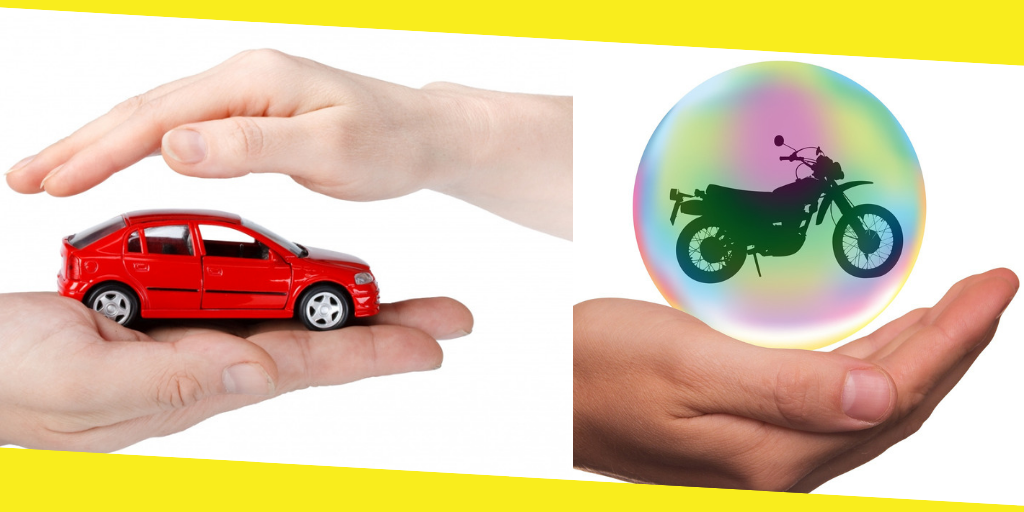Insuring a Car vs Insuring a Motorbike
This post was last updated on November 30th, 2022

If you’re operating an engine-powered vehicle on the UK’s roads, you’ll need to insure it, whether it has four wheels or two. But insurance products for cars and motorbikes are different, to reflect the different risks and uses of these vehicles. A car insurance policy won’t be applicable to a motorbike and vice versa.
Motorbikes are riskier to drive: per mile travelled on the UK’s roads, motorcyclists are 38 times more more likely to killed in a traffic accidents than occupants of cars. There’s a reason motorcyclists suit up in helmets and leather when jumping on the back of their bike. They’re also more likely to be stolen. However, high rates of theft and accident and the severity of those accidents are offset by the lower purchase and repair price of motorbikes, meaning motorbike insurance is often cheaper per month.
However, the type of motorbike you select—whether it’s a moped or a classic two-wheeler and what size engine it boasts—will influence your premiums, much like the model and engine of your car will impact your auto insurance premiums.
Similarities Between Motorbike and Car Insurance
Levels of cover
For both cars and motorbikes you can buy three different levels of cover. Third party is the statutory minimum level of cover for any vehicle on the UK’s roads. It compensates other people for damage you may cause while operating your vehicle to their vehicles, property, and lives. Third party, fire and theft gives you the same liability cover but also protects you vehicle against damage from fire and from theft, a particular concern for motorbike drivers, whose rides are stolen more frequently than cars. Fully comprehensive policies cover you for all the above and damage to your own vehicle, even if the accident was your fault. Despite their higher level of cover, fully comprehensive policies are often the cheapest on the market, as riskier drivers and riders tend to flock to TP and TPFT policies.
No claims bonuses
Prove to your insurer that you’re a safe driver and prudent vehicle owner by racking up years without claims or convictions and whether you’re running a people carrier or a chopper, your premiums will fall.
Young people will pay more
The grim crash statistics posted by young drivers extend to young motorcyclists and insurers hike premiums for between 17 and 25 accordingly.
Compare quotes to save
The more quotes you can seek out, the better policy you’ll find. Plug details about yourself, your vehicle, and address into a comparison engine to gather dozens of quotes in seconds.
How Motorbike Risk Groupings are Different
Insurance groups
Cars will be grouped into car insurance groups ranging from 1 to 50, depending on their price as new, engine power, desirability, and security measures, with cars in higher groups costing more to insure. Motorbikes and scooters are grouped into one of 17 groups, depending on the type of vehicle—whether it’s a moped or an American cruiser—its engine size, cost, and attractiveness to thieves.
Security measures
Additional security measures like alarms and immobilisers can trim the cost of your auto insurance but the impact can be greater for motorbikes, which are at higher risk of being stolen. Insurers will especially want to know how you’re locking up your motorbike and where it’s being stored at night.
Training for discounts
While taking a Pass Plus course can theoretically lower car insurance premiums, the discounts aren’t widespread. Motorbike driving is more technical and while you can operate a motorbike with a provisional licence (having passed Compulsory Basic Training), earning advanced riding qualifications through an accredited programme like the Royal Society for the Prevention of Accidents (RoSPA)’s Advanced Motorcycle Training can shave your premiums.
Seasonal driving and declaring your motorbike off-road
Under Continuous Insurance Enforcement (CIE) legislation, all vehicles in the UK need to be insured, unless they’re laid up and have been officially declared off road. The process of declaring a motorbike and car off road is the same—you’ll have to obtain a Statutory Off Road Notice (SORN)—but motorcyclists are more likely to want to obtain one. If you’re planning on parking up your motorbike during the winter months, you’ll need a SORN to avoid insuring it while it’s not being used. However, with the introduction of CIE in 2011, short-term and seasonal motorbike policies have become more difficult to find and with typical insurance policies charging early cancellation fees, it might be cheaper and involve less hassle to simply insure your bike over the winter.
Recommended For You
Unmissable Factors to Lower Your Car Insurance…
Most Inside
Most Inside offers high-quality recommendations and valuable updates to enhance all aspects of your life, providing premium guidance and enriching experiences.




